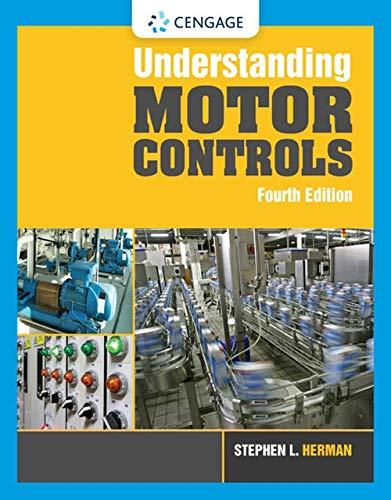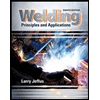
Manufacturing Engineering & Technology
7th Edition
ISBN: 9780133128741
Author: Serope Kalpakjian, Steven Schmid
Publisher: Prentice Hall
expand_more
expand_more
format_list_bulleted
Concept explainers
Question
Chapter 1, Problem 43QTP
To determine
The unit cells shown in Figs. 1.3-1.5 can be represented by tennis balls arranged in various configurations in a box. In such an arrangement, the atomic packing factor (APF) is defined as the ratio of the sum of the volumes of the atoms to the volume of the unit cell. Show that the APF is
Expert Solution & Answer
Want to see the full answer?
Check out a sample textbook solution
Students have asked these similar questions
What would the electropneumatic diagram of a circuit with the sequence a+b+c+(a-b-c-) look like?
### What would the electropneumatic diagram of a circuit with the sequence a+b+c+(a-b-c-) look like, with a counter, in the fluidsim?
You are asked to design a unit to condense ammonia. The required condensation rate is 0.09kg/s. Saturated ammonia at 30 o C is passed over a vertical plate (10 cm high and 25 cm wide).The properties of ammonia at the saturation temperature of 30°C are hfg = 1144 ́10^3 J/kg andrv = 9.055 kg/m 3 . Use the properties of liquid ammonia at the film temperature of 20°C (Ts =10 o C):Pr = 1.463
rho_l= 610.2 kf/m^3
liquid viscosity= 1.519*10^-4 kg/ ms
kinematic viscosity= 2.489*10^-7 m^2/s
Cpl= 4745 J/kg C
kl=0.4927 W/m CCalculate the surface temperature required to achieve the desired condensation rate of 0.09 kg/s( should be 688 degrees C) a) Show that if you use a bigger vertical plate (2.5 m-wide and 0.8 m-height), the requiredsurface temperature would be now 20 o C. You may use all the properties given as an initialguess. No need to iterate to correct for Tf. b) What if you still want to use small plates because of the space constrains? One way to getaround this problem is to use small…
Chapter 1 Solutions
Manufacturing Engineering & Technology
Ch. 1 - What is the difference between an atom and a...Ch. 1 - Prob. 2RQCh. 1 - Prob. 3RQCh. 1 - Prob. 4RQCh. 1 - Define anisotropy. What is its significance?Ch. 1 - What effects does recrystallization have on the...Ch. 1 - What is strain hardening, and what effects does it...Ch. 1 - Explain what is meant by structure-sensitive and...Ch. 1 - Prob. 9RQCh. 1 - What influence does grain size have on the...
Ch. 1 - What is the relationship between the nucleation...Ch. 1 - What is a slip system, and what is its...Ch. 1 - Explain the difference between recovery and...Ch. 1 - What is hot shortness, and what is its...Ch. 1 - Explain the advantages and limitations of cold,...Ch. 1 - Describe what the orange peel effect is. Explain...Ch. 1 - Some metals, such as lead, do not become stronger...Ch. 1 - Describe the difference between preferred...Ch. 1 - Differentiate between stress relaxation and stress...Ch. 1 - What is twinning? How does it differ from slip?Ch. 1 - Prob. 21QLPCh. 1 - What is the significance of the fact that some...Ch. 1 - Is it possible for two pieces of the same metal to...Ch. 1 - Prob. 24QLPCh. 1 - A cold-worked piece of metal has been...Ch. 1 - What materials and structures can you think of...Ch. 1 - Two parts have been made of the same material, but...Ch. 1 - Do you think it might be important to know whether...Ch. 1 - Explain why the strength of a polycrystalline...Ch. 1 - Describe the technique you would use to reduce the...Ch. 1 - What is the significance of the fact that such...Ch. 1 - Prob. 32QLPCh. 1 - It has been noted that the more a metal has been...Ch. 1 - Is it possible to cold work a metal at...Ch. 1 - Comment on your observations regarding Fig. 1.14.Ch. 1 - Is it possible for a metal to be completely...Ch. 1 - Prob. 37QTPCh. 1 - Prob. 38QTPCh. 1 - Plot the data given in Table 1.1 in terms of...Ch. 1 - A strip of metal is reduced from 30 mm in...Ch. 1 - Prob. 41QTPCh. 1 - How many grains are there on the surface of the...Ch. 1 - Prob. 43QTPCh. 1 - Prob. 44QTPCh. 1 - Prob. 45QTPCh. 1 - A technician determines that the grain size of a...Ch. 1 - If the diameter of the aluminum atom is 0.28 nm,...Ch. 1 - The following data are obtained in tension tests...Ch. 1 - Prob. 50QTPCh. 1 - Prob. 51QTPCh. 1 - Prob. 52QTPCh. 1 - Same as Prob. 1.39, but ASTM no. versus...Ch. 1 - By stretching a thin strip of polished metal, as...Ch. 1 - Draw some analogies to mechanical fiberingfor...Ch. 1 - Draw some analogies to the phenomenon of hot...Ch. 1 - Take a deck of playing cards, place a rubber band...Ch. 1 - Give examples in which anisotropy is scale...Ch. 1 - The movement of an edge dislocation was described...
Knowledge Booster
Learn more about
Need a deep-dive on the concept behind this application? Look no further. Learn more about this topic, mechanical-engineering and related others by exploring similar questions and additional content below.Similar questions
- Homework#5arrow_forwardQuestion 1: Beam Analysis Two beams (ABC and CD) are connected using a pin immediately to the left of Point C. The pin acts as a moment release, i.e. no moments are transferred through this pinned connection. Shear forces can be transferred through the pinned connection. Beam ABC has a pinned support at point A and a roller support at Point C. Beam CD has a roller support at Point D. A concentrated load, P, is applied to the mid span of beam CD, and acts at an angle as shown below. Two concentrated moments, MB and Mc act in the directions shown at Point B and Point C respectively. The magnitude of these moments is PL. Moment Release A B с ° MB = PL Mc= = PL -L/2- -L/2- → P D Figure 1: Two beam arrangement for question 1. To analyse this structure, you will: a) Construct the free body diagrams for the structure shown above. When constructing your FBD's you must make section cuts at point B and C. You can represent the structure as three separate beams. Following this, construct the…arrow_forwardA differential element on the bracket is subjected to plane strain that has the following components:, Ɛx = 300 × 10-6, Ɛy = 150 × 10-6, Ɛxy = -750 x 10-6. Use the strain-transformation equations and determine the normal strain Ɛx in the X/ direction on an element oriented at an angle of 0 = 40°. Note, a positive angle, 0, is counter clockwise. x Enter your answer in micro strain to a precision of two decimal places. eg. if your answer is 300.15X106, please enter 300.15.arrow_forwardIf the 50 mm diameter shaft is made from brittle material having an ultimate strength of σult=595 MPa for both tension and compression, determine the factor of safety of the shaft against rupture. The applied force, F, is 140 kN. The applied torque T, is 5.0 kN⚫m. Enter your answer to a precision of two decimal places. T Farrow_forwardЗіс 1 mH 10 Ω m 16 cos 2.5 × 104 A Lic 592 10 Ω 1 μFarrow_forwardHomework#5arrow_forwardHomework#5arrow_forwardOxygen (molar mass 32 kg/kmol) expands reversibly in a cylinder behind a piston at a constant pressure of 3 bar. The volume initially is 0.01 m3 and finally is 0.03 m3; the initial temperature is 17°C. Calculate the work input and the heat supplied during the expansion. Assume oxygen to be an ideal gas and take cp = 0.917 kJ/kg K. For 1 bonus mark explain why (using your understanding of thermodynamics) that oxygen is used in this context rather than water vapour.arrow_forwardHydrodynamic Lubrication Theory Q1: Convert this equations into Python by 1- ah ap a h³ ap 1..ah = ax 12μ ax ay 12μ ay 2 ax Where P=P(x, y) is the oil film pressure. 2- 3μU (L² ε sin P= C²R (1+ cos 0)³ Q2: prove that |h(0) = C(1+ cos 0) ?arrow_forward### To make a conclusion for a report of an experiment on rockets, in which the openrocket software was used for the construction and modeling of two rockets: one one-stage and one two-stage. First rocket (single-stage) reached a maximum vertical speed of 200 m/s and a maximum height of 1000 m The second rocket (two-stage) reached a maximum vertical speed of 250 m/s and a maximum height of 1800 m To make a simplified conclusion, taking into account the efficiency of the software in the study of rocketsarrow_forwardWhat is the difference between saturated liquid and compressed liquid? What is the difference between the critical point and the triple pointarrow_forwardWhat is quality? Does it have any meaning in the superheated vapour region? What is the difference between saturated vapor and superheated vapour? What is the difference between saturated liquid and compressed liquid? What is the difference between the critical point and the triple point?arrow_forwardarrow_back_iosSEE MORE QUESTIONSarrow_forward_ios
Recommended textbooks for you
 Understanding Motor ControlsMechanical EngineeringISBN:9781337798686Author:Stephen L. HermanPublisher:Delmar Cengage Learning
Understanding Motor ControlsMechanical EngineeringISBN:9781337798686Author:Stephen L. HermanPublisher:Delmar Cengage Learning Welding: Principles and Applications (MindTap Cou...Mechanical EngineeringISBN:9781305494695Author:Larry JeffusPublisher:Cengage Learning
Welding: Principles and Applications (MindTap Cou...Mechanical EngineeringISBN:9781305494695Author:Larry JeffusPublisher:Cengage Learning

Understanding Motor Controls
Mechanical Engineering
ISBN:9781337798686
Author:Stephen L. Herman
Publisher:Delmar Cengage Learning

Welding: Principles and Applications (MindTap Cou...
Mechanical Engineering
ISBN:9781305494695
Author:Larry Jeffus
Publisher:Cengage Learning